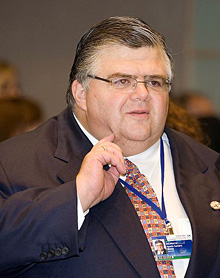
|  |  |  Business News Business News  
Carstens May Delay Mexico Rate Increase as Peso Tops Currencies
 Businessweek Businessweek
go to original
April 27, 2010


| | Agustin Carstens |  |
Mexico’s central bank may say this week that inflation is under control, betting the peso’s world- beating rally will curb price increases and allow policy makers to keep the overnight rate unchanged for six months.

Banco de Mexico is using the currency appreciation as a “second instrument” to keep a lid on prices, said Eduardo Suarez, an emerging-market strategist at RBC Capital Markets in Toronto. The peso has rallied 7.7 percent this year, the most among the 16 major currencies tracked by Bloomberg.

While annual inflation reached a seven-month high in March, exceeding the central bank’s forecasts, the board led by Governor Agustin Carstens may use a quarterly report tomorrow to say the increase is being driven by one-time effects from taxes and gasoline costs, Suarez said. Banco de Mexico has kept the benchmark interest rate at 4.5 percent since July and Carstens said March 21 there’s no need to boost rates “at this stage.”

“He’s been dovish so far,” Suarez said in a telephone interview from Toronto, after returning from a trip to Mexico City this month during which he met with policy makers. “They’re allowing the peso to appreciate to slow the export sector and offset inflationary pressures from that end.”

Banco de Mexico will hold off from raising rates until October, when a 0.25 percentage point increase is likely, according to the median forecast of 23 economists surveyed by Citigroup Inc.’s Banamex unit for a report published April 19.

Peso’s Impact

A stronger peso curbs inflation by making it cheaper to import goods, according to Neil Shearing, an analyst at Capital Economics in London. The currency rally also moderates growth for exporters by making their goods more expensive in dollar terms and allows domestically driven sectors such as the service industry to catch up, according to RBC.

Annual inflation quickened to 4.97 percent in the 12 months through the end of March, topping the central bank’s forecast of an increase of 4.25 percent to 4.75 percent in the period. Deputy central bank Governor Guillermo Guemez said in an April 19 interview that Mexico’s target for inflation of 3 percent next year is “very realistic.”

More recent inflation data support Carstens’ policy. Consumer prices unexpectedly fell 0.31 percent in the first half of April. Economists predicted a 0.09 percent increase, according to the median estimate.

The mid-April inflation data “reflects exactly what the central bank was thinking,” said Pedro Tuesta, a senior economist for Latin America at 4Cast Inc.

‘Salsa Effect’

Inflation in the first three months of the year was the short-term consequence of higher taxes and the “salsa effect,” or volatility from products such as tomatoes and onions, said Sergio Luna at Citigroup Inc.’s Banamex unit in Mexico City.

Inflation picked up this year after the government began raising prices for state-controlled goods such as gasoline and implemented tax increases called for in the 2010 budget. At the same time, core inflation, which excludes some food and energy prices, slowed to an annual pace of 4.4 percent in March, a two- year low.

Banco de Mexico has held its benchmark interest rate for eight consecutive meetings, and policy makers will announce their next decision May 21.

Short periods of volatility don’t justify a pre-emptive rate increase, said Allyson Benton, a risk analyst with the New York-based Eurasia Group.

‘Reactive’ Governor

“Carstens is going to be a reactive rather than a proactive central bank president,” Benton said. Carstens, 51, started his job Jan. 1. He served as finance minister for three years prior to joining the bank.

Central bank officials in Mexico City didn’t respond to telephone and e-mail requests for comment.

The peso may strengthen to 11 per U.S. dollar during 2010 from 12.1518 at the end of the day yesterday before finishing the year between 12 pesos and 12.2 pesos, said Rogelio Ramirez de la O, the only Mexican economist to predict the 1994 peso devaluation. That will fail to lower inflation, which may reach 5 percent by year-end, he said.

“The Bank of Mexico has lost control of inflation,” Ramirez de la O, the sole partner at research firm Ecanal, said in an April 21 interview in Mexico City. “Carstens sought to be too accommodating to the government’s need to avoid making the private sector angry by raising interest rates.”

With assistance from Andres R. Martinez in Mexico City.

To contact the reporter on this story: Jonathan Levin at jlevin20(at)bloomberg.net
|

 |
|  |



